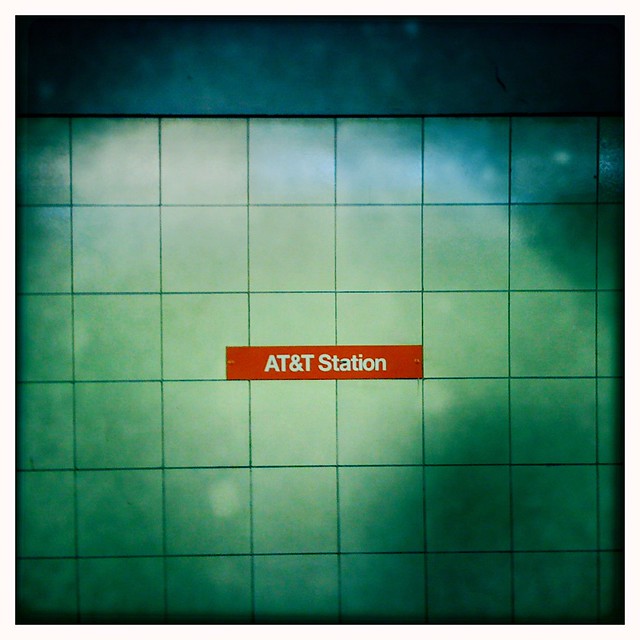As more and more members of the new Republican majority in the State Senator and a few Democrats too have taken aim at the state’s controversial commuter mobility tax, I’ve speculated about a tit-for-tat trade. In return for a reduced tax burden for suburban business, Albany could support and approve a congestion pricing fee for New York City with dedicated revenues for the MTA. For city transit advocates who have long pushed for a pricing plan, such a proposal would be ideal.
Today, we learn that forces are quietly gathering in Albany to push such a plan. With a new name attached to it — traffic pricing as opposed to congestion pricing — Sen. Daniel Squadron is, in the words of The Daily News, “rounding up colleagues” who will support his plan to charge $10 per car to enter parts of Manhattan. In exchange, the payroll mobility tax would be drastically altered.
Squadron, who is working with members of the Bloomberg Administration to develop a concrete proposal, sees congestion pricing as a way to restore stability to the MTA’s balance sheet. “The MTA needs a sustainable funding source,” Squadron said. “This has to be on the table.”
Adam Lisberg has more:
While there is no formal proposal, the money could restore some of last year’s MTA service cuts, halt the next fare increase and reduce the payroll tax outside the five boroughs…Now, backers call it “traffic pricing” – and want to build support among outer borough and suburban lawmakers before proposing a specific plan…
One idea would reduce the payroll tax on businesses outside Manhattan – which could win backing from suburban lawmakers. “Everybody out in the suburbs hates the payroll tax, so the idea of ‘feathering’ the tax could be helpful,” said one person involved. “This has to be a regional effort. It has to enjoy regional support,” the source added.
Driver fees could also reverse some of the MTA service cuts that eliminated two subway lines and 36 bus routes last year, and help plug the system’s $10 billion long-term maintenance gap. They could also delay the 7% fare hike scheduled for a year from now, backers hope.
Despite these hopes, Senate Majority Leader Dean Skelos seems less welcoming of the idea. In an interview today with Capital Tonight, he called congestion pricing “just another tax” and said he wouldn’t support the plan even if it resulted in a lower payroll tax for suburban businesses. It sounds as though the MTA might have to threaten steep fare hikes to see such a pricing plan realized.
Still, as someone who has supported congestion pricing since Day One and loves the idea of using this fee to reduce auto traffic while supporting transit, it’s tough to find anything wrong with this plan. I would caution its supporters not to overreach though. New York City residents have expressed their support for congestion pricing as long as revenues go toward the MTA, but how far can those revenues go?
Already, in the build-up to a concrete plan, early whispers have these revenues being used to (a) restore service lost to the June cuts; (b) lower or avoid the 2013 fare hike; and (c) help close the $10 billion gap in the capital plan. The money generated simply cannot go that far. Three years ago, officials estimated approximately $400 million in annual revenue from congestion pricing, and that’s enough to reverse the service cuts and likely avert some of the fare hike. It’s not enough to also begin bonding out the next capital plan. Someone will have to make some tough choices there.
From a policy perspective, I’d prefer to see congestion pricing revenue go toward expanding service. If that means capital investments and rolling back service cuts, then we’ll just suffer through another fare hike that’s probably inevitable anyway. By putting a price on driving, the city will send more people to the subways, and the system must have the reach and capacity to respond. The fare, while good for politicians looking to curry favors, matters less in the long-term than expansion and maintenance.
No matter the outcome, though, it’s nearing time to rally the troops for another fight. This time, the state, despite Skelos’ objection, should work to approve congestion pricing. For the sake of transit, for the sake of our productivity and for the sake of the environment, the city will be much better off for it.



 As the MTA gears up for another round of board meetings this week after a six-week winter hiatus, the crime numbers are going to take center stage. Already, amNew York’s Theresa Juva has
As the MTA gears up for another round of board meetings this week after a six-week winter hiatus, the crime numbers are going to take center stage. Already, amNew York’s Theresa Juva has